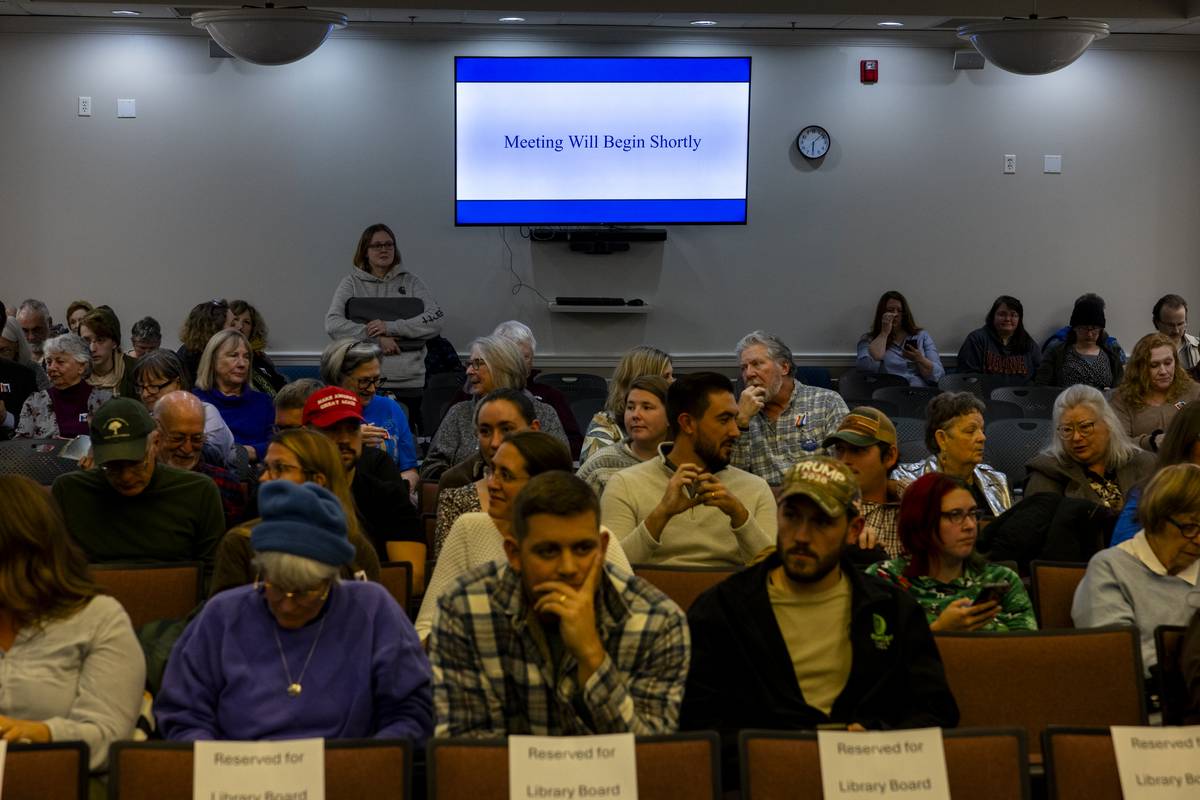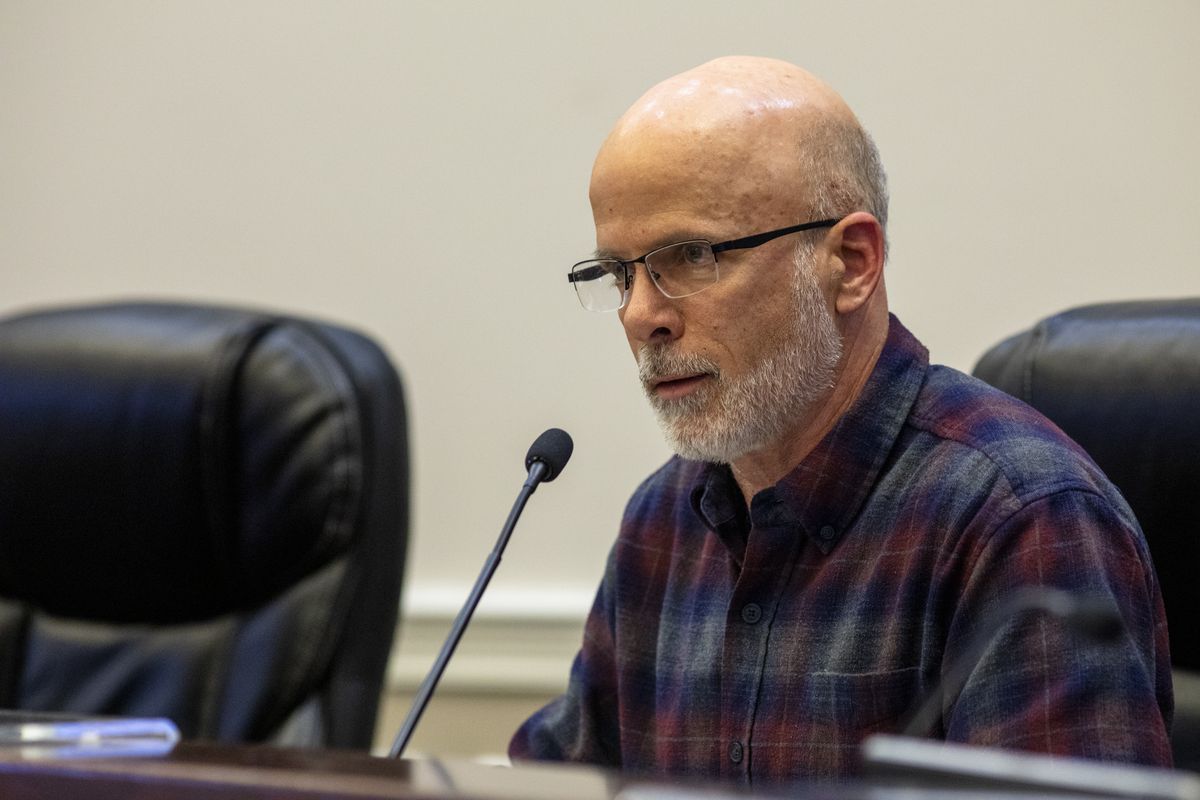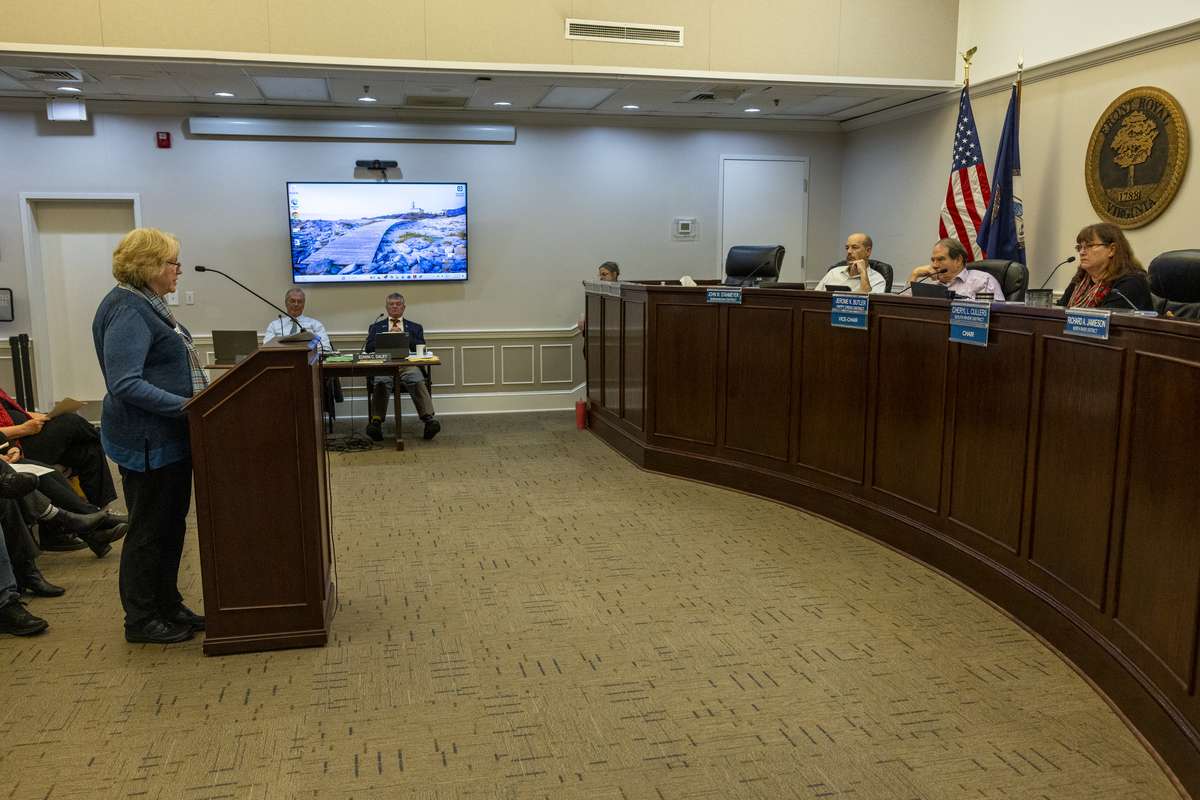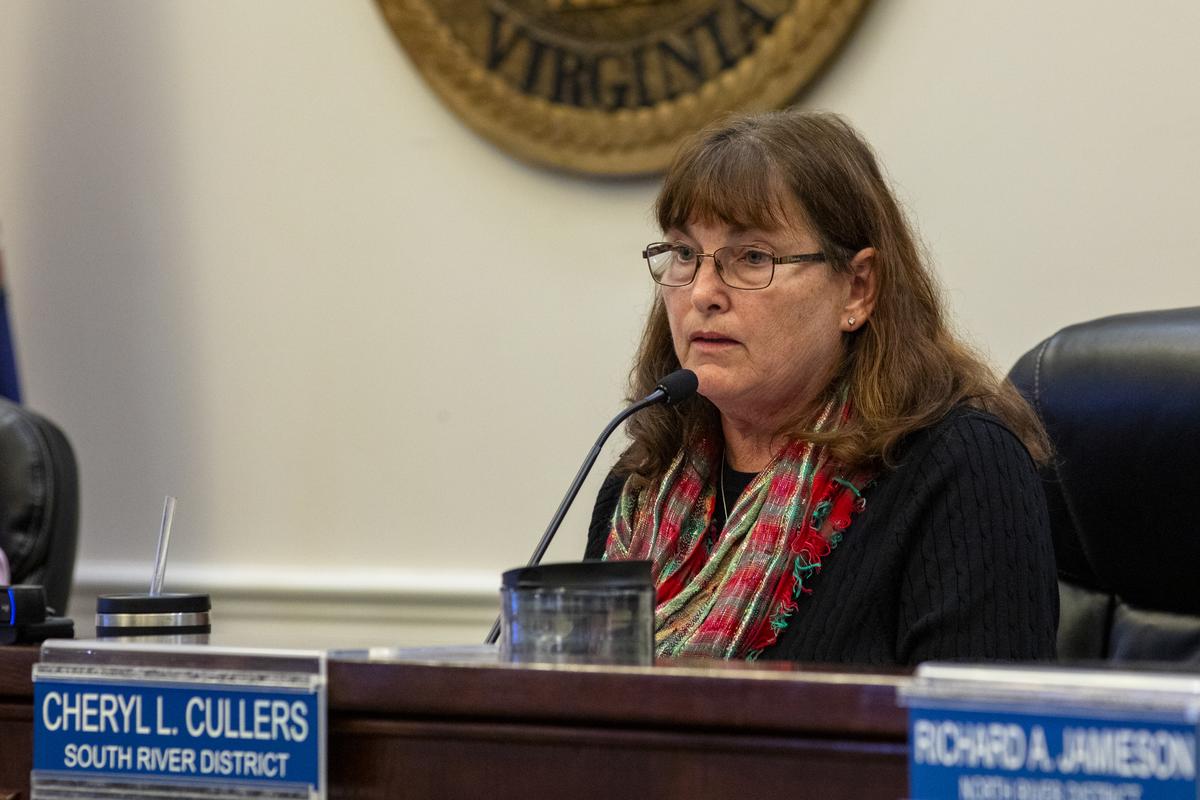
People fill the meeting room of the Warren County Board of Supervisors on Dec. 10 in Front Royal, Virginia. The board voted to create a new library board to oversee the Samuels Public Library, where culture wars over LGBTQ+ books had been ongoing.

Warren County Board of Supervisors member Richard Jamieson speaks during the meeting.

Melody Hotek, Samuels Public Library trustee president, speaks at the meeting.

Cheryl Cullers, chair of the Warren County Board of Supervisors.
13:54 JST, December 12, 2024
FRONT ROYAL, Va. – Hour upon hour, residents marched to the lectern – grandparents, home-schoolers, veterans, teachers, merchants, farmers, students – an unlikely cross-section of this little community united in one mission: defending their public library against what they saw as a hostile takeover by the Warren County Board of Supervisors.
It didn’t work.
The all-Republican board voted 4-1 early Wednesday to take greater control over Samuels Public Library, which was honored as Virginia’s 2024 Library of the Year but has clashed with conservative county leaders over LGBTQ-themed books and now finds its future plunged into uncertainty.
After a six-hour public hearing in which nearly 100 residents begged them not to act, the supervisors voted at 2 a.m. to create a new library board to oversee policy and budget. Fewer than 20 speakers supported the county plan, but several supervisors said they believed that far more of their constituents in this heavily conservative county favored taking action.
The effort could see Samuels – whose roots go back to 1799 – replaced as the county’s library services provider by the end of the fiscal year in June. The library’s president said after the meeting that trustees will explore all options, including seeking private funding to break off from the county entirely.
The effort to exert political control over the independent, nonprofit library drew national attention last year when a small group of residents waged a campaign against LGBTQ+ books primarily aimed at young readers. County leaders eventually backed down on a threat to withhold funding after the library rolled out new parental tools, but the culture war continued to simmer in this small Shenandoah Valley community 50 miles west of Washington where the courthouse displays a Nativity scene and a banner reading, “Keep Christ in Christmas.”
On Tuesday night and into Wednesday morning, many speakers who urged the supervisors to rein in the library cited last month’s presidential victory by Donald Trump, who carried Warren County with 68 percent of the vote.
“That is a suffocating supermajority,” said Luke Marrazzo, linking the library proposal to ideas of accountability and efficiency “that define this new era in America that was just elected. … It is also participating in a sweeping nationwide movement. Link arms and lock shields with a mandate handed to you in no uncertain terms. Return the power and the voice of the people.”
But speaker after speaker, some of whom had shown up as early as 3 p.m. for a public hearing that started more than four hours later, exhorted the supervisors to keep politics out of the library, which they said is a “crown jewel” beloved by a diverse population.
“It’s the Library of the Year,” Mark Nelson told the board. “You guys tried to ban some gay books, got beat, now this. Everybody knows the truth. Let it be.”
Others said the library’s autonomy as part of a public-private partnership is actually a conservative strength.
“While the last election signaled the American people want less government, the supervisors seem to be moving in the opposite direction of the voters. Simply put, this proposal represents creeping government overreach,” said Joe Plenzler, a Marine Corps veteran who recently moved to Warren County.
But county supervisor Richard Jamieson, who proposed the new library board as part of a 58-page “debrief” that took Samuels’s leaders by surprise last month, insisted after the long public hearing that his only goal is to protect the public interest.
“There are reasonable indications that savings of hundreds of thousands of dollars are plausible if the Warren County Library Board went into a competitive procurement process,” Jamieson said. As he began referring to charts and tables from his report in the wee morning hours, many library supporters and trustees got up and walked out.
Despite Jamieson’s assurances that “this doesn’t put anything good … that Samuels does at risk,” he acknowledged that the new board would explore hiring someone different to come in and run the county’s library more cheaply than Samuels, which could then serve as a nonprofit library booster organization, if it wished, he said.
And he denied that the effort was aimed at banning books. “There’s honestly no valid reason to suppose that Warren County Library Board would not act constitutionally,” he said.
Jamieson was not an elected official in 2023 when he wrote letters to the editor and participated in a conservative Catholic group filing challenges to library books at Samuels. The wave of “requests for reconsideration” against titles such as “This is Why They Hate Us” and “Ana on the Edge” overwhelmed library staff as they tried to follow painstaking review procedures for each book.
Under pressure from the small but vocal group, county supervisors demanded action and postponed three-quarters of the library’s yearly appropriation, which at about $1 million is the largest single component of the roughly $1.5 million Samuels budget. Samuels trustees and staff defended the books, but rearranged library spaces and created new tiers of library cards for children so parents could exert more control.
The county leaders backed off and renewed funding through June 2025.
After running unopposed and being elected last November, Jamieson spent most of this year quietly assembling the report that faulted Samuels for lax oversight and for resisting pressure to purge the disputed books. He was joined in the effort by fellow supervisor Vicky Cook, who was in office last year and had praised the library for resolving its issues.
Samuels is a private nonprofit governed by a 15-member board selected from the county’s five districts, including lawyers, accountants, government contractors, home-schoolers and business people, as well as a representative from the board of supervisors. Trustee president Melody Hotek was named 2024 trustee of the year by the Virginia Library Association and the Friends of Samuels was honored as top library booster group.
The county’s action ushers in major uncertainty. Samuels owns the library’s contents but leases its 26,000-square-foot building from the county, with about 15 years remaining on the term. Many speakers Tuesday and Wednesday found fault with Jamieson’s analysis of the library’s finances, pointing out that the county and library had studied switching to public operation in 2017 and concluded that the existing setup was more cost-effective.
“I have issues with this because I feel it’s being rushed through,” county board chairwoman Cheryl Cullers said. “It’s too many questions that need to be answered. I think it needs more work.” Cullers moved to postpone the vote but no one seconded. She then cast the only vote against the plan to create the new board.
Afterward, as the last weary observers left the county government center, Hotek and a few library staffers reassured one another. “I’m not surprised. I’m disappointed,” Hotek said. Now she needed information so the trustees can make contingency plans.
“A lot is still unknown,” she said, particularly what the county means by empowering the new board to handle policy. “What kind of policies? Policies for the board? Policies for the library? There’s just a lot of questions to answer.”
If the county wants to work with Samuels but insists on a level of control that jeopardizes its nonprofit status, there’s one last option: Total independence.
“We need money,” Hotek said. “I don’t think we end if we can find funding. We’re going to do everything in our power to keep going.”
Top Articles in News Services
-

Survey Shows False Election Info Perceived as True
-

Hong Kong Ex-Publisher Jimmy Lai’s Sentence Raises International Outcry as China Defends It
-

Japan’s Nikkei Stock Average Touches 58,000 as Yen, Jgbs Rally on Election Fallout (UPDATE 1)
-

Japan’s Nikkei Stock Average Falls as US-Iran Tensions Unsettle Investors (UPDATE 1)
-

Trump Names Former Federal Reserve Governor Warsh as the Next Fed Chair, Replacing Powell
JN ACCESS RANKING
-

Producer Behind Pop Group XG Arrested for Cocaine Possession
-

Japan PM Takaichi’s Cabinet Resigns en Masse
-

Man Infected with Measles Reportedly Dined at Restaurant in Tokyo Station
-

Israeli Ambassador to Japan Speaks about Japan’s Role in the Reconstruction of Gaza
-

Videos Plagiarized, Reposted with False Subtitles Claiming ‘Ryukyu Belongs to China’; Anti-China False Information Also Posted in Japan























